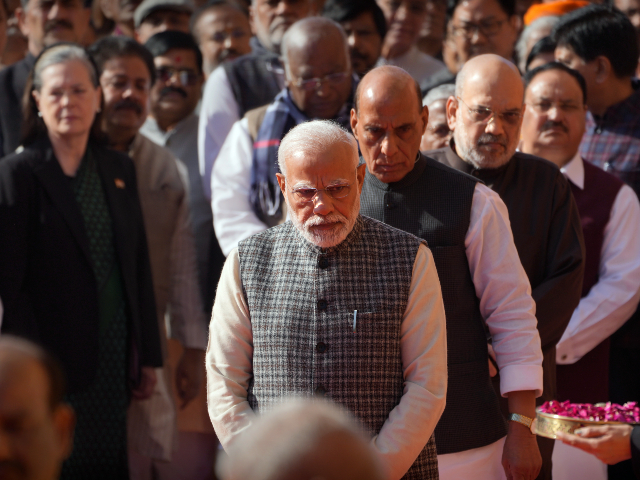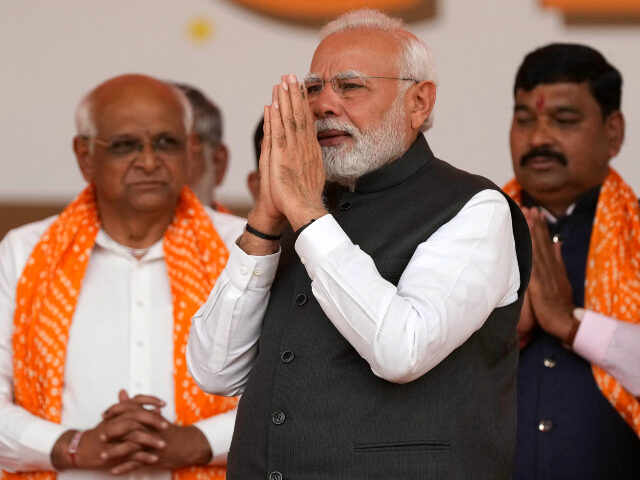Indian Prime Minister Narendra Modi held a phone conversation on Friday with his Russian counterpart Vladimir Putin to congratulate each other on skyrocketing bilateral trade and hint at future “security” cooperation, according to Russian media.
The phone call follows India experiencing an invasion on its northern border by the Chinese People’s Liberation Army (PLA) this weekend in which, Indian government officials have claimed, the PLA troops crossed into India and attacked Indian forces with rudimentary weapons such as sticks and “monkey fists,” an iron wrap around the hands. The incident reportedly ended with only minor injuries on either side and the Indians confirmed that PLA forces were no longer on their land.
The Chinese Communist Party – one of Russia’s closest allies – has largely remained mum on the incident, confirming that it occurred but claiming the Indians had illegally invaded China and stating only that the situation on the border was “generally stable” as of Tuesday.
China and India are both pivotal allies to Russia. The three countries, along with Brazil and South Africa, form the potent “BRICS” economic and security cooperation bloc, which is currently planning an expansion and potential replacement of the U.S. dollar as the standard international trade currency. Both China and India have remained relatively silent on Russia’s ongoing invasion of Ukraine, urging dialogue without levying blame on either side or offering any material support.
Modi and Putin last met in person in September while attending the Shanghai Cooperation Organization (SCO), a security coalition created by China, in Uzbekistan.
The Kremlin confirmed on Friday that Modi and Putin discussed Ukraine, but offered only that Modi asked Putin for, and received, “a principled assessment regarding Russia’s policy in Ukraine.”
Both leaders, the Russian government went on to say in its readout of the call, applauded each other for the growing economic ties between their nations.
“While expressing satisfaction with the high level of bilateral cooperation that has been developing on the basis of the Russian-Indian privileged strategic partnership,” the Kremlin said, “the two leaders discussed in detail the prospects for practical cooperation in mutual investment, energy, agriculture, transport and logistics.”
Trade between India and Russia has skyrocketed following the escalation of the nearly nine-year-old Russian invasion of Ukraine this year. Western sanctions on Russian oil and coal have made the exports cheaper, attracting Indian business. Bilateral trade between India and Russia reached record highs between April and August of this year, largely thanks to fossil fuel commerce, and Russia rose from India’s 25th largest trade partner last year to its seventh largest in 2022. Russia became India’s top oil supplier in November, beating out Iran and Saudi Arabia.
Indian officials have condemned American and other Western leaders who have cautioned New Delhi not to fund the Ukrainian war with Russian trade, insisting “no moral conflict” exists in the purchases and noting that many Western European countries have allowed Russian natural gas exports to dominate their markets.
On Friday, the Russian news agency Tass reported, citing the Indian government’s readout of the conversation, that Modi responded to Putin’s assessment of the Ukraine war by urging “dialogue and diplomacy” on either side, but not offering support for the perspective of either combatant in the conflict.
Tass further added that, according to New Delhi, Modi and Putin “reviewed several aspects of the bilateral relationship, including energy cooperation, trade and investments, defense and security cooperation, and other key areas.”
Russia and India have a long history of security cooperation in the form of weapons sales to New Delhi.
“We have a long-standing relationship with Russia, and this relationship has served our interests well,” Indian External Affairs Minister S. Jaishankar boasted in October, complaining that the United States chose to ally with Pakistan, India’s regional rival, when Russia was open to selling India weapons.
“We have, as you know, a substantial inventory of Soviet and Russian-origin weapons, and that inventory actually grew for a variety of reasons,” Jaishankar explained at the time, “you know, the merits of the weapon systems themselves, but also because for multiple decades, Western countries did not supply weapons to India, and in fact saw a military dictatorship next to us as the preferred partner.”
Arming India could have further geopolitical consequences for Russia in the face of its neighbor China’s repeated violations of India’s sovereignty in the past two years.
The Indian government confirmed this week that PLA troops invaded India’s Arunachal Pradesh region on December 9. The Indian Army said in a statement that both sides endured only “minor injuries” and that India expelled the invading force “in a firm and resolute manner.”
Indian media outlets, citing unnamed sources, estimated the invading force as between 200 and 600 soldiers wielding sticks with nails hammered into them and trying to use them to break through the Indian force.
The incident was the latest in a series of increasingly frequent incursions by the Chinese military across the Indian border, the deadliest of which is believed to have left about 60 men dead in 2020. On that occasion, both sides claimed that the other’s soldiers crossed their borders, but the brawl occurred in India – in the Galwan Valley, located in India’s Ladakh region. Indian officials confirmed about 20 deaths and claimed that about 40 Chinese soldiers died, but the Chinese government has only confirmed four deaths in that encounter at press time.
Retired Indian General MM Naravane, who presided over the army during the Galwan Valley brawl, accused the Chinese military on a podcast this week of “hooliganism” and taking modern warfare back to “prehistoric” times.
“We would still like to maintain that we are a 21st-century Army. To start going back to clubs and barbed wires is going back to prehistoric times,” Naravane said. “It is a very regressive way of going. We would still like to maintain that in warfare also there are certain rules. It is not that you do whatever you want to do.”
“Is that the level PLA has gone down to? Hooliganism and streetfighting? Or they are a professional 21st-century army?” he asked. “On one side they try to show their technological prowess, on the other side they are coming with barbed wire clubs. It is ridiculous.”

Indian Prime Minister Narendra Modi with his cabinet colleagues and other political leaders stand in a queue to offer floral tributes to the victims of 2001 terror attack on Parliament House, in New Delhi, Tuesday, Dec. 13, 2022. (AP Photo/Manish Swarup)
The dispute spilled onto the United Nations stage on Friday, as Indian External Affairs Minister Jaishankar addressed the Security Council and announced India’s renewed bid for a seat on the body. India currently wields the presidency of the Council but it will lose its place on it entirely at the end of the year.
Jaishankar used the opportunity to condemn “double standards” by permanent members of the Council in defending terrorism, presumably a jab at China for blocking the designation of Pakistani terrorists.
“How do we deal with double standards, both inside and outside this council? For too long, some have persisted with the approach that terrorism is just another instrument or stratagem,” Jaishankar said.
China is the only permanent member of the Council to have never endorsed an Indian bid for a seat.

COMMENTS
Please let us know if you're having issues with commenting.